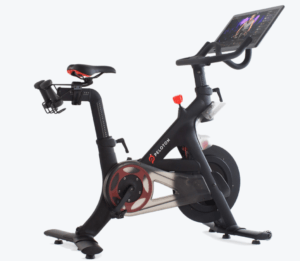Peloton: Bringing the Studio to You

Peloton has created their own “fitness as a service” ecosystem that delivers the quality and experience of a boutique studio workout without leaving your home.
The $28B American fitness industry is no stranger to a passing trend. Through the decades, consumers have flocked to gyms, classes, and increasingly, to boutique fitness studios like Soul Cycle, Fly Wheel, and Berry’s Bootcamp. But as consumers lives have gotten busier, and free time shortened, a new space has opened for fitness that fits within our crowded lives.
As technology has made other parts of our lives more convenient and on demand, Peloton has sought to do the same for fitness. Peloton offers consumers fitness equipment – bikes and, recently, treadmills – that are digitally connected to broadcast Peloton’s live and on-demand fitness classes directly onto a connected screen, bringing the boutique fitness experience to the home. In addition to the on-machine interface, Peloton developed an app to allow subscribers to access Peloton workouts even when they’re not at home.
For $1,995, consumers can purchase a connected Peloton bike and pay a $39 monthly subscription for access to live and on demand classes filmed in Peloton’s NYC studio. Peloton’s found John Foley (HBS 01’), views Peloton’s model as “fitness as a service” and an alternative to the prices paid for comparable workouts in boutique studios (SoulCycle NYC – $34/class, FLYwheel NYC – $36/class). Peloton’s newest launch, a $3,995 treadmill, showcased at the Consumer Electronics Show this year, takes aim at boot camp style workouts with the same model (Berry’s Bootcamp NYC – $36/class). The high initial cost of the bikes and treadmills may be a barrier to entry for some consumers, but those who do buy in have a very low churn rate (reported at 0.3%), thus the company is able to earn recurring revenue on the subscription services.
Peloton’s strategy to become the at home fitness platform owner allows them to fully control their product ecosystem. They manufacture and sell the hardware, update and maintain the software to deliver the programming, design, produce, and own the content, and sell the subscriptions to customers. By developing their own product ecosystem, they’re able to capture the maximum value from customers (no one to split it with!). In addition, with the development of new products (treadmills), they have a greater ability to attract and capture additional value from customers. By owning the ecosystem, Peloton can also control which partners to allow access. They’ve recently announced a partnership with FitBit to allow consumers to sync data from their Peloton workouts to their FitBit devices – which will likely drive even more stickiness for users.
Peloton has reportedly has about ~75,000 bike users and service subscribers (as of January 2017) thus far, and is beginning to ramp up international expansion. 2017 sales clocked in at $400M, more than double the 2016 sales of $170M. While it may be way too early to say that Peloton has won the high-end fitness market, it is safe to say that competitors are scared. FLYwheel, a popular national boutique spinning studio, has launched their own me-too product called FLY Anywere. FLYwheel’s bike decouples the bike ($1,699) from the built-in screen ($400 add on), to allow users to utilize a television set, mobile device, or tablet, and offers the same $39/month subscription fee. While the offering is comparable, Peloton’s in-market time advantage means they have a much larger library of on-demand content (>8,000 classes) to offer consumers, and given their investment in the technology platform, they have a greater ability to expand into new offerings like the treadmill and potentially other equipment in the future (ex: rowing machines, weight machines). Investors have also affirmed their confidence in Peloton, which has reached the “unicorn” level of valuation in their latest rounds of funding ($325M for a $1.25B valuation).
Sources:
https://www.entrepreneur.com/article/306545
https://www.flywheelsports.com/packages
https://www.soul-cycle.com/series/
https://www.barrysbootcamp.com/pricing/noho/
https://www.cbsnews.com/news/peloton-launches-a-4000-treadmill-at-ces/
https://techcrunch.com/2017/01/06/peloton-commercial-at-ces/
https://www.cbsnews.com/news/peloton-launches-a-4000-treadmill-at-ces/
https://techcrunch.com/2017/05/24/peloton-is-now-a-unicorn-because-of-the-spinning-class-craze/






I studied the Peloton case too as I found the “fitness as a service” you mentioned a very interesting business model and fitness trend for the future.
I guess the main questions I am left with are:
– will Peloton’s success replicate outside the New York fitness bubble?
– how will Peloton be able to differentiate itself from well known spinning brands like Soul Cycle and Flywheel?
My view on the latter is that Peloton should consider opening the content platform to third party / private providers, to increase demand-side network effects and aggressively acquire new customers, while also entering the B2B channel (hotels, condos, etc.) for customer retention and acquisition.